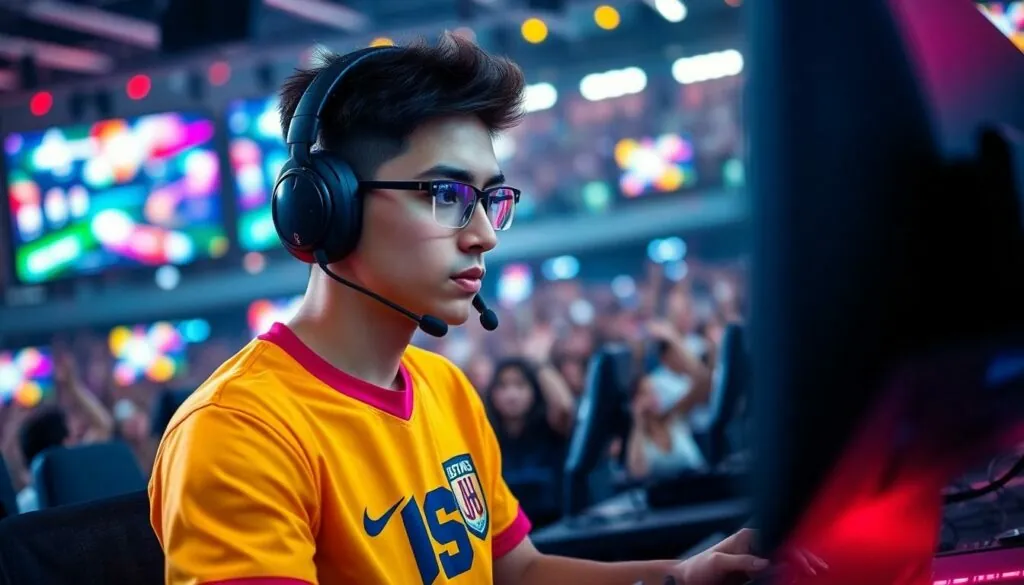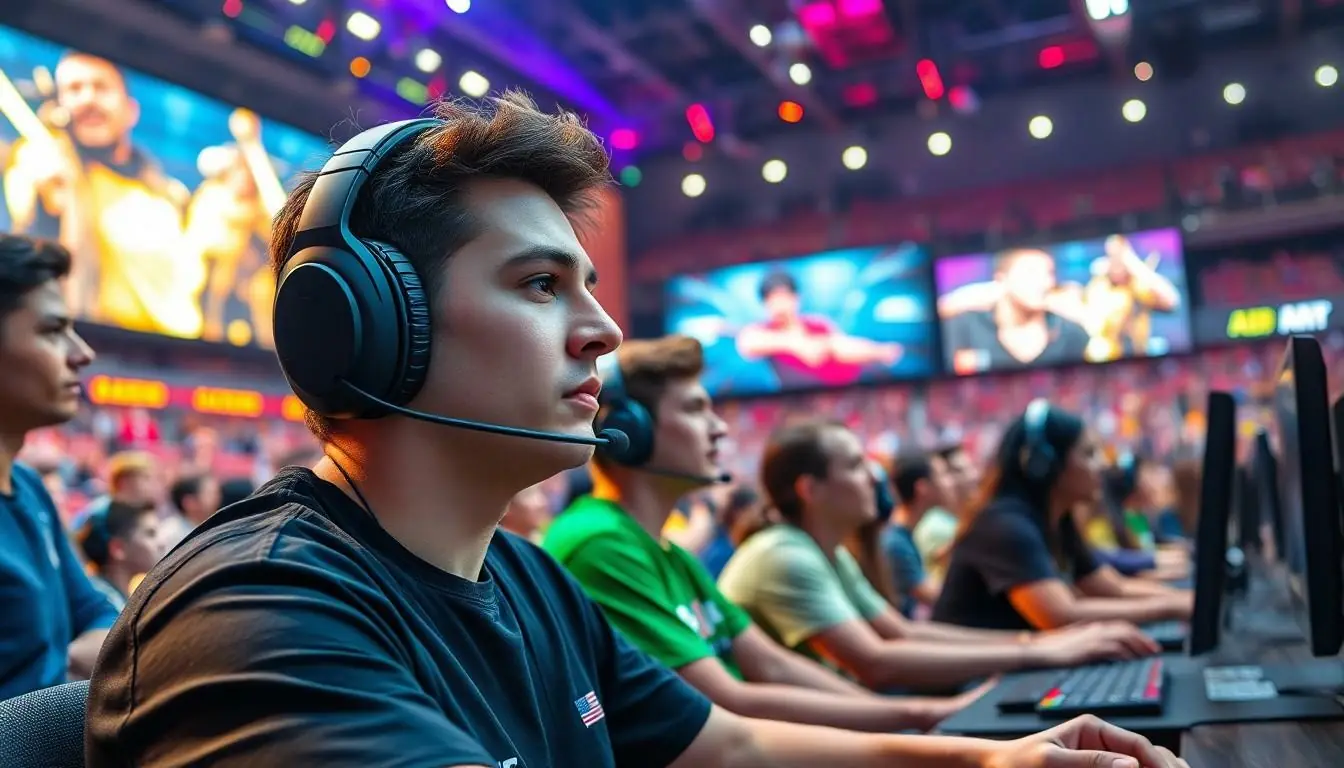Table of Contents
ToggleImagine a world where athletes trade their running shoes for gaming headsets, and the thrill of victory comes with a side of pixelated glory. Welcome to the exciting realm of Olympic esports games, where competitive gaming meets the grandeur of the Olympic spirit. As traditional sports evolve, esports is stepping onto the global stage, proving that you don’t need to sweat buckets to earn a gold medal.
Overview of Olympics Esports Games
Olympics esports games represent a significant evolution in the sporting landscape, merging traditional competition with digital gaming. Many view these events as a new frontier that celebrates skill, strategy, and teamwork, akin to traditional Olympic disciplines. Various titles have been featured, with notable games such as “League of Legends,” “FIFA,” and “Street Fighter” showcasing competitive gameplay.
Global interest in esports has surged, attracting millions of viewers worldwide. In 2021, the International Olympic Committee (IOC) recognized this growing phenomenon, organizing the Olympic Virtual Series. This initiative aimed to engage a younger audience and promote fitness through virtual means, aligning with the Olympic values of excellence, friendship, and respect.
Diverse competitions are expected to enhance inclusivity within the Olympic framework. Through technology and gaming platforms, participants from various backgrounds can compete, breaking geographical barriers that limit traditional sports. The digital nature of these games fosters community and accessibility, encouraging more individuals to participate, whether as players or spectators.
Significant investment continues to flow into the esports sector, influenced by partnerships and sponsorships. This influx of resources is likely to facilitate innovative event formats and experiences, further integrating esports into mainstream culture. By blending competitive gaming with the Olympic spirit, the movement towards Olympics esports games appears set to reshape the future of athletic competition.
History of Esports in the Olympics
Esports have emerged as a significant factor within the Olympic framework. This evolution reflects a growing recognition of competitive gaming as a legitimate form of sport.
Early Inclusion of Esports
The earliest ties between esports and the Olympics trace back to 1988, when the Seoul Summer Games featured a demonstration of arcade games like “Tetris” and “Street Fighter.” These initial appearances showcased the potential for digital gaming in a competitive environment. Fast forward to 2018, the Asian Games included esports as a medal event. This inclusion marked a pivotal moment, as it highlighted the increasing acceptance of video games within traditional sports. Various titles such as “Arena of Valor” and “League of Legends” drew substantial participation, signaling a shift in public perception.
Milestones Leading to Official Recognition
Several milestones propelled esports toward official recognition by the International Olympic Committee. The 2020 Olympics faced challenges due to the pandemic, prompting a pivot to online platforms. In 2021, the IOC organized the Olympic Virtual Series, which featured esports competitions linked to Olympic values. This initiative attracted significant viewership and participation, emphasizing skill and strategy in gaming. Partnerships with esports organizations further bolstered credibility and infrastructure for future events. The increasing number of esports tournaments across the globe demonstrated a growing appetite for competitive gaming, corroborating its place alongside traditional sports in the Olympic movement.
Popular Esports Games Featured
Olympic esports games bring exciting competition to viewers, showcasing popular titles that resonate globally. These games highlight skill, strategy, and teamwork, mirroring traditional Olympic events.
Titles in the 2024 Olympics
The 2024 Olympics showcases several engaging esports titles. Games like “FIFA,” “League of Legends,” and “Gran Turismo” make their mark in the event lineup. Furthermore, titles such as “Street Fighter” demonstrate the diverse experiences that appeal to both casual and competitive players. These selections reflect the distinct blend of sportsmanship and digital expertise, drawing attention from audiences worldwide.
Fan-Favorite Esports Genres
Genres like battle royale, sports simulations, and fighting games capture the interest of many fans. Battle royale games like “Fortnite” offer intense competition and strategic gameplay. Sports simulations such as “FIFA” and “NBA 2K” provide realistic experiences, allowing players to embody their favorite athletes. Fighting games, represented by “Street Fighter” and “Tekken,” emphasize skill and reflexes, attracting dedicated communities. These genres exemplify the dynamic nature of esports, fostering inclusive environments that appeal to a wide audience.
Impact on Traditional Sports
Olympic esports games significantly influence traditional sports, fostering a new era of competition and engagement.
Bridging the Gap Between Esports and Sports
Esports create an innovative environment that connects digital gaming with traditional athleticism. Events like the Olympic Virtual Series resonate with younger audiences, promoting both skill and teamwork. Participants share commonalities with conventional athletes, showing that dedication and strategy drive success. Incorporating popular titles familiarizes mainstream sports with the gaming community, further expanding fan engagement. This synergy cultivates an environment where traditional sports can coexist with esports, appealing to a wider demographic. Gameplay showcases required skills similar to physical sports, allowing esports to be viewed as an extension of athletic competition.
Challenges and Controversies
Despite the positive impact, challenges arise as traditional sports grapple with the rise of esports. Issues of legitimacy linger, with critics questioning whether gaming qualifies as sport due to its minimal physical aspect. Additionally, some view the integration of esports as a threat to the values of traditional athleticism. Concerns about addiction and mental health also surface, particularly among younger players. Navigating these controversies necessitates careful consideration of both industries, ensuring that the integrity of sports remains intact. Balancing tradition with innovation presents a complex but essential challenge for the future of competitive gaming within the Olympic framework.
Future of Olympics Esports Games
The Olympic esports landscape is rapidly evolving. Various factors contribute to its formative years, indicating what lies ahead.
Potential Expansion and New Titles
New titles may emerge in future Olympic esports competitions. Games reflecting popular trends like virtual reality and augmented reality could enhance engagement. Developers are constantly innovating, likely introducing variety to the roster. Popular genres include first-person shooters and strategy games, attracting diverse audiences. Inclusion of titles such as “Valorant” and “Dota 2” might captivate competitive gamers and further drive interest. Esports organizations frequently collaborate with game developers to refine competitive balance, ensuring fair play. This adaptability fosters excitement, generating anticipation for future titles in the Olympic framework.
Predictions for Future Collaborations
Future collaborations could connect traditional sports and esports, enhancing the overall experience. Partnerships between the International Olympic Committee and leading game publishers are likely if trends continue. Such collaborations might involve esports leagues and federations, promoting cross-discipline events. These synergies could draw audiences from both sports communities, increasing viewership. Expansion beyond competitive gaming into educational programs may encourage youth participation. Furthermore, initiatives aiming at health and wellness may utilize gaming platforms to engage younger populations. This interconnected approach promises to elevate the Olympic spirit as esports gain further acceptance within the global sports community.
Conclusion
The rise of Olympic esports games marks a pivotal moment in the evolution of sports. By blending traditional competition with the digital realm, these events capture the essence of teamwork and strategy. As esports gain traction within the Olympic framework, they promise to engage a diverse audience and foster inclusivity.
With a growing investment in the sector and the emergence of innovative formats, the future of Olympic esports looks bright. The potential for collaboration between the IOC and game developers opens doors for exciting new experiences. As the lines between physical and digital sports continue to blur, the Olympic spirit stands to thrive in this dynamic landscape.





